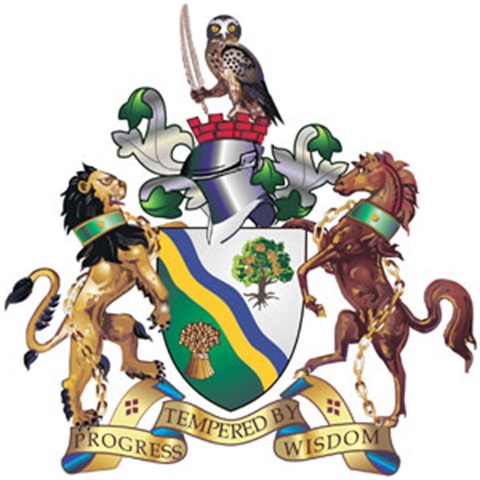Coat of Arms

The Arms
These are borne on the shield and are the most important part of the achievement.
The two most prominent charges (as the symbols of heraldry are called) on the shield are the oak tree and the wheatsheaf.
The oak tree symbolises the extensive wooded areas that were cleared to make way for progress, particularly along the River Torrens and in the south-western area of the City and at the same time reflects Council’s interest and concern in beautification of the city and the development of recreational facilities.
The wheatsheaf ('garb') is the heraldic symbol for agriculture and refers to the early farming pursuits of the first settlers.
The blue wavy line indicates water, specifically the Rivers Torrens and Sturt which, in part, form common boundaries of the city and the gold wavy line, the Anzac Highway renamed from the Bay Road on 6 November 1924 in memory of the fallen in the (then) Great War 1914-1918.
The Crest
The helmet appropriate to a Local Government Authority is that of an Esquire with the visor closed.
Surmounting the helmet to which mantling is attached is a mural crown applicable to our city rank and rising from the crown is a Boobook owl (Mopoke) holding a quill pen in outstretched claw representative of management governed by wisdom.
This particular bird is of a species common to West Torrens and is also an allusion to the motto 'Progress Tempered by Wisdom'.
The Supporters
These literally support the shield. Their origin is purely artistic and they came into heraldry at the end of the 15th Century.
Supporters are granted to peers, senior knights and certain noted corporations, of which West Torrens is deemed to be one.
The horse generally represents courage, strength, intellect, loyalty, devotion and ‘readiness of all employments for king and country’.
The lion is a reference to the 'British Lion' and is symbolical of the history of our early development by settlers from that country.
Both supporters are gorged with a collar bearing a roundel, with chains attached and reflexed around them.
The collar and chain represent control and authority proper to a corporate authority, while the chain’s colour and the roundels on the collars are an allusion to the city’s corporate logo.